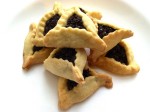Poppy seed hamantashen from owl-at-home.blogspot.ca.
Purim has its share of food customs as it is observed by Jewish communities around the world, but for this article, I will narrow my question to one: why the poppy seeds – particularly in hamantashen?
A little research indicates that Esther ate seeds as part of her efforts to maintain a kosher diet. They are also said to have been the only food Esther ate during the three-day fast before she went to see the king.
Another interpretation indicates that poppy seeds symbolize the promise G-d made to Abraham (Genesis 22:17): “I will bless thee and, in multiplying, I will multiply thy seed as the stars of the heaven, and as the sand which is upon the seashore …” because this is the antithesis of the annihilation planned by Haman.
Mohn, the Yiddish word for poppy seed, was combined with milk, sugar or honey and sometimes raisins and nuts and used as a filling as early as medieval times. Tasch is German for pocket, so the original name was mohntaschen, pockets filled with poppy seeds. Why pockets? Because of Haman’s coat pockets, where he carried the lots (purim) he cast to determine on which day the Jews would be killed.
When Jews fled Germany for Eastern Europe, in the Middle Ages, they took the poppy seed pastry with them and added the Yiddish prefix ha, thus making it hamohntaschen.
By the way, if you plant poppy seeds, you end up with poppy flowers. Their unripe seed capsules, when processed, are the source of heroin, opium and morphine. It is said that if you consume poppy seed-filled cake or pastry, including hamantashen, you could test positive on a drug test. Many years ago, a state police crime lab in Oregon tested the driving ability of subjects who had consumed 25 grams of poppy seeds baked into a bundt cake and found that their driving ability was not impaired – however, they did test positive for opiates. Another bit of research indicated that eating two poppy seed bagels could cause failure of a drug test!
Poppy seeds contain high amounts of oil and are best refrigerated when not being used. They are also an excellent source of calcium. But don’t eat too many, as a 50-gram hamantash may have 200 calories.
Speaking of poppy seeds, poppy seed cookies, or mohn kichel, are also popular for Purim, as is mohn torte, or poppy seed cake where two layers of pastry dough are filled with a mixture of poppy seeds, sugar or honey, ground almonds and raisins.
Another interesting note: for Purim, some people make challah shaped into a very long braid – to symbolize the rope used to hang Haman. And, in keeping with tradition, why not add some poppy seeds to it?
Sybil Kaplan is a journalist, foreign correspondent, lecturer, food writer and book reviewer who lives in Jerusalem. She also does the restaurant features for janglo.net and leads weekly shuk walks in English in Jerusalem’s Jewish food market.

